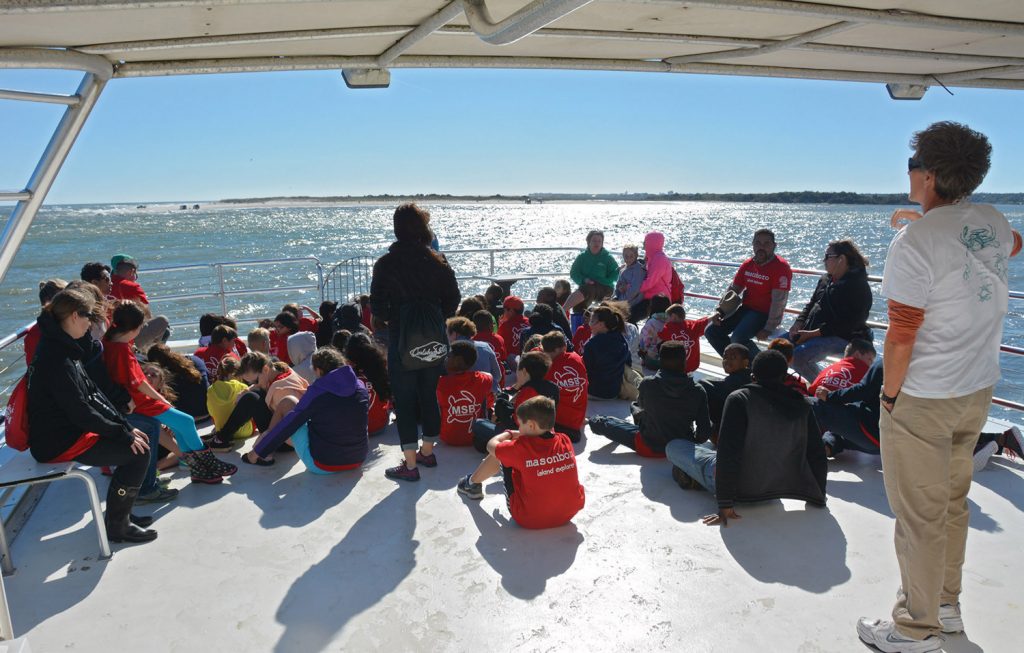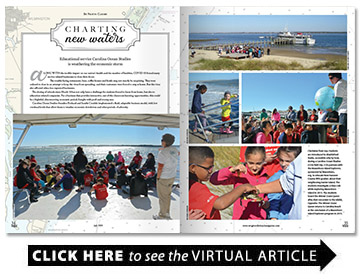Charting New Waters
Educational service Carolina Ocean Studies is weathering the economic storm
BY Fritts Causby

Along with the terrible impact on our nation’s health and the number of fatalities, Covid-19 forced many service-related businesses to close their doors.
The trouble facing restaurants, bars, coffee houses and hotels may not exactly be surprising. They were ordered to close in an attempt to keep the virus from spreading, and their customers were forced to stay at home. But the virus also affected other, less expected businesses.
The closing of schools since March 14 has not only been a challenge for students forced to learn from home, but also to education-related companies. For a business that provides interactive, out-of-the-classroom learning opportunities, this could be a frightful, disconcerting economic period, fraught with peril and stormy seas.
Carolina Ocean Studies founders Richard and Sandie Cecelski implemented a fluid, adaptable business model, with low overhead levels that allow them to weather economic slowdowns and other periods of adversity.
Carolina Ocean Studies (COS) has taken large and small groups out to North Carolina’s barrier islands and reefs for educational tours since 1992. In addition to providing a variety of learning enrichment programs for students, the organization also serves local Scout troops, home-schoolers, senior and church groups.
Because the school programs are curriculum-based and conducted by experienced instructors, COS is consistently recommended as a learning resource for teachers. Before being forced into a hiatus by COVID-19, the organization offered pier- and lagoon-based learning programs, crabbing and fishing trips, and nautical excursions to the ecologically fascinating deserted beaches and spoil islands that make North Carolina the special place it is.
“Educational programs such as the ones provided by Carolina Ocean Studies are essential to creating an interest in preserving our natural resources and helping shape the next generation of environmental stewards,” says Kevin Piacenza, board chair of the Cape Fear chapter of the Surfrider Foundation.
COS takes students and other groups to Masonboro Island and places like Cape Lookout, the Core Banks, and Shackleford Banks where it is not uncommon to see groups of wild ponies grazing in high numbers. These educational tours allow participants to learn more about marine life and ecology, catch fish and net other critters, view living history, and study pristine beaches.
“The programs offered by Carolina Ocean Studies are wonderful, because they really give the students an opportunity to experience their learning,” says Victoria Minshew, a fifth-grade teacher at College Park Elementary in Wilmington. “As a Title 1 school, some of these kids have never even seen the ocean before, even though we are really close by, so these programs are very meaningful.”
Though the company has taken a hit because of the downtime mandated by the virus, Richard Cecelski explains that the decision to only use chartered vessels has been a key component in surviving the economic hit.
“Not having to pay for dock fees or deal with ongoing maintenance issues has allowed us to concentrate on what we do best, namely, providing education-based coastal tours,” he says. “The rules for compliance with the Coast Guard are always changing, and boats always seem to need some sort of repair. The costs for being compliant with the rules and obtaining necessary repairs can quickly spiral into the tens of thousands.”
Cecelski has been working with many of the same charter boat captains for years, helping ensure the safety of students as well as consistency and security. Having multiple locations is another strategy for minimizing risk the company uses successfully.
From Harkers Island in Carteret County, the company provides educational tours to Cape Lookout, the Core Banks, and Shackleford Banks. Tours of Masonboro Island depart out of Carolina Beach. A three-mile offshore fishing trip uses Calabash in Brunswick County as its home base, and an estuary quest takes place at Fort Fisher lagoon. There’s also a Gulf Stream Nature Excursion and a Pier into the Ocean program held at the Kure Beach Pier.
To make the most of the COVID-19 downtime, Cecelski and the team — which includes his wife, Sandie, a retired teacher who started the Marine Science Academy at Ashley High School — have been developing new projects, refining existing systems and planning for the future.
“We’ve been working on developing some online complements to the boating trips, along with some educational resources for the students to use before, during and after our programs,” Cecelski says. “While I think the field trips have a huge motivational power, because they are naturally engaging, the students might not often remember a lot about it. We’re hoping that the resources we are currently working on will allow the experience to resonate with the students long after it’s over.”
If there is a bright spot, it is that teachers and administrators are going to have more time to plan for fall trips.
Kids say their favorite part of the experience is crabbing. When discussing their enthusiasm for it, Cecelski’s love for working with children shines through: “Most of these kids have never caught a wild animal, so it’s really exciting for them. Also, there’s more technique to it than people realize, since you have to lure them into the net and then keep them from escaping. The crab will often escape and end up somewhere around everyone’s feet.”
An added draw for the kids is that COS uses fish for bait instead of chicken parts.
“We always call out, ‘Do you want fish heads or tails?’ and the kids love that,” laughs Cecelski. “Also, there’s a reason why blue crab is so revered. They are delicious. But they are also dangerous. This combination of the delicious and dangerous is something every kid loves.”
Crabbing is a real experience, something that is increasingly important in the modern age, when prying a child away from a tablet or phone can be extremely difficult.
“There’s a lot to distract kids away from what’s really important these days,” Cecelski says. “They really love visiting places that have a wild feel to them.”
Cecelski expressed his gratitude to the team of volunteers at Masonboro.org, a nonprofit that is focused on protecting public access, promoting responsible use and preserving the traditions of Masonboro Island.
From humble beginnings in 2013, when the charity provided the funds for 50 fifth-graders from New Hanover County to be a part of the tour of Masonboro, the impact grew to over 1,300 students served in 2019.
“Thanks to the collaboration between us and Masonboro.org, NERRS, NHCS, Duke Energy and so many other generous individuals, the Island Explorers program gives New Hanover County fifth-graders the chance to be field scientists for a few hours, helping them make real life connections to the concepts in the classrooms,” says Jane Radack, program director at COS. “It’s great to see how exploring coastal ecosystems excites the kids!”
The importance of providing children with hands-on learning experiences is a recurring theme on the Carolina Ocean Studies’ website. Online resources are incredible and one has to wonder where our society would be these days without them. But there is no substitute for getting outside, exploring the natural world, bouncing ideas between fellow students, or learning from teachers as they illustrate the facts and theories found in the classroom or online.
